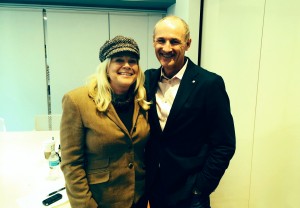
“It’s Good to be King”
Colm Feore is no stranger to playing kings in Shakespearean plays, and now he’s portraying the king of all kings—King Lear. He stars in the film King Lear that opens today, February 25, which was originally produced as a play for the Stratford Shakespeare Festival in Canada. We met in Chicago at the “new” Virgin Hotel on a rather chilly day, February 18. He was charismatic, delightful, and hysterically comical as we chatted about superheroes and their connection to Shakespeare, the “why” of the popularity of Shakespeare, working with director Clint Eastwood, and if you’re ever in France, he gave me a quick lesson on how to pretend to speak French…aka “fake French.”
Besides Feore’s variety of Shakespearean roles, he’s also appeared in major motion pictures such as The Amazing Spider-Man 2, Thor, and The Changling. You’ll view him soon on the TV show Gotham as Dr. Francis Dulmacher aka The Dollmaker.
Sarah Knight Adamson: Colm Feore, it’s so great to meet you. You’re starring in a new film, King Lear, a Shakespearean tragedy. What’s it like for an actor to play a king, as opposed to other roles?
Colm Feore: You know, the hardest part about being a king is thinking that you’re going to have to act kingly, because I’m not really sure how that works. There’s a phrase that we use in the theater: “It’s the crowd that makes the king.” When we send the responsibility to the rest of the company, suddenly, it makes sense. I come into the room, you kneel; I guess I’m the king. It’s the way the people treat the royalty. It’s marks of respect like a little bowing and “Yes, my Lord, three bags full, my Lord, thank you, your Highness.” It’s all that kind of stuff. Shakespeare’s very clear about how he wants his kings treated, so for us, it was simple enough to inhabit.
SKA: Oh wonderful. I know, and I’m sure your fans know, this is not the first time you played a king. You’ve played Richard III, the Pirate King, The King of the Fairies in Midsummer’s Night Dream. Most recently, I believe, in Thor, you were King Laufey. I’m seeing a theme here.
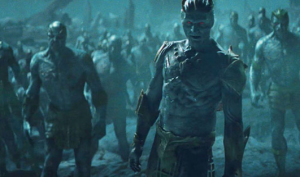
CF: A few princes too, like Hamlet and others who … Oh and the King of Bohemia, in Winter’s Tale, Leontes.
SKA: I thought there might be more. How wonderful. Do you see any similarities in these roles; the princes and kings you play?
CF: You know, the thing that Shakespeare is trying to do with kings is get people at the top of society in the Greek sense so that it will be shock and awe when they tumble. An audience looks and says, “Well, if that can happen to a king who has everything in the world, and people to protect him, and enough food, and clothing, and fire, wow. I hope my life doesn’t end like that. I’m so glad I’m not a king.” Uneasy lies the head that wears the crown, right?
SKA: Exactly.
CF: It’s very helpful for Shakespeare to set these grand creatures up, only to knock them down for our entertainment.
SKA: Yes. Oh wonderful; that’s a great perspective on that. I hadn’t thought of that. Yes, even my daughter and I watching movies about princesses. It’s like we wouldn’t even want to be a princess, with all they have to do.
CF: It’s tough work, because half of it is public relations, so you’re always on, you’re always pretending, because you’ve got a role to play. One of the biggest problems in King Lear is he abdicates his role. He gives away his part. He says, “I don’t want to be king anymore. I want you treat me like a king, I’m going to behave like a king, but I don’t want to do the day-to-day job of being actually king; that stuff is basically a drudge. I’m going to let you do that, and I’m going to retire to the South of France.”
SKA: Well, that’s a great place to retire.
CF: Well, that’s why he’s trying to marry his daughter Cordelia off to a French guy. He’s got the King of France and the Duke of Burgundy. The other daughters married English guys and had to stay home. You know how horrible it is summering in Cornwall? No, no, no. He wants the South of France.
SKA: Oh, that Shakespeare, he really was something, wasn’t he?
CF: He knew his stuff. He knew his geography.
SKA: To me, it appears that this role of King Lear is the “crème de la crème” of dramatic roles. Could you speak to that for a little bit, please?
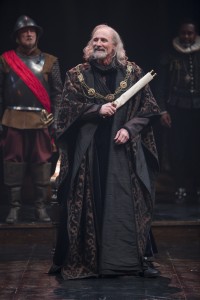
CF: I think you’re absolutely right; it is the top of the pops. It’s something you can only do, I believe, once you’ve done everything else. I’ve been very fortunate. I have pretty much done everything else, and the important ones to do that lead you to King Lear. Macbeth, Hamlet, Leontes is very key in that. Trucchio, Romeo, Yachamo—you name it. The reason for that is, King Lear needs the sum total of everything you learned how to do in all those other plays, and you have to do it all at the same time. In the others, it’s different. The language supports you, the way the structure is there supports you. In King Lear, it starts hard, it stays hard, and it ends hard. It’s a hugely demanding role in terms of physical rigor, but also intellectually and vocally, and all of that.
SKA: Why are you drawn to Shakespearean scripts? Could it be the many lessons? If you could choose a few lessons that we could learn from these scripts, what would they be?
CF: He manages to say things better than anybody else has ever said them, and in a simpler way. He manages to convey what we’ve often thought and felt but couldn’t articulate, so we can use Shakespeare, we can steal his words as he stole words, stories, and ideas from everywhere else and cobbled together to make the best thing that we’ve got in the English language.
Consequently, you throw yourself into it. You understand your humanity better, and you understand how hard it is to be human. You have compassion, and you look at people with a certain amount of grace, and you forgive them their sins because they’re human.
That learning, it doesn’t have any kind of religious aspect to it, though it is ceremonial. We all get together in a dark room to celebrate being human together, and it’s called the theater. Shakespeare is its greatest practitioner.
SKA: How fantastic. I know you’ve been in a comic book film, The Amazing Spider-Man 2, and we are now about to see you in the TV series Gotham. How would you compare the superhero characters to Shakespearean characters?
CF: If you look closely at a lot of the superhero movies, you’ll find that some are very fine classically trained actors. Thor was directed by Sir Kenneth Branagh, and starred no less than Sir Anthony Hopkins, with whom I’d done a Shakespeare movie. We’re hired because we can say things that might be slightly heroic and dumb in a profound and credible way.
It takes that kind of experience. I love it. I think that doing those things, you don’t see it as silly in any way. You invest in the character with the same kind of gravitas that you would with King Lear. It allows us a kind of shorthand too, which saves money, which filmmakers always like. We don’t have time for rehearsal, so if you can speak quickly to address a point to do a better scene, to do a better shot, it’s great to have that background.
SKA: That’s wonderful. What we’re seeing today is the emergence of more anti-heroes. In our films, TV, and literature. Can you give us some examples of some of your favorite anti-heroes and why you feel maybe you’re drawn to them, or perhaps why we are starting to be drawn to them?
CF: Well, you know, we are all flawed as human beings. No matter how wonderful and perfect we think we are, we know in that little dark place in our souls that there’s maybe something missing, or that we haven’t quite achieved, and that we’re just not perfect people. Shakespeare manages to show what looked like perfect people expose their imperfections. We then feel for them because we understand them and they speak to us, they give us a vocabulary to deal with our own demons and our own issues. When we recognize what we recognize in the anti-heroes is ourselves, and there’s forgiveness in that.
Sometimes, because the anti-heroes do things that are anti-social, wildly dramatic, sometimes dangerous, sometimes murderous, we think, “If I were only brave enough to stand up to the world, I’d be like the guy in Breaking Bad. I would become my own worst nightmare, but I would at least find fulfillment, and because I’m doing it for the right reasons trying to put my family through schools and support and save them, that there’s an ethical, moral center to the thing.”
It adds a great deal of complexity, and what we recognize, I think emotionally, is complexity. Why are we looking at vampires? What’s the fascination with that? Because the idea of having 150 years of experience, 200, 400, 600 years of experience appeals to us. You think, “Well, maybe I’ll get it right this lifetime around.” It’s sexy stuff.
SKA: I’d like to ask you about Clint Eastwood. Working in the movie The Changeling. Can you tell us about his directing style, or anything you’d like to say about Clint?
CF: Clint is an extraordinary director. It was an exceptional experience. He doesn’t like to meet actors in a room, which is where we think we’re best, that we’re the most charming, and the most agreeable, and we can seduce people into thinking, “Ah, you must hire me.” I was in London, England at the time, shooting an improvised film, where we were making up the lines as we were going along. Most of my colleagues were playing patients, I had to play a doctor, so I was inventing all kinds of polysyllabic scientific rubbish, and I had no script, per se. I was at the end of my rope. Up came the audition for Clint. I said, “I’ll fly to new York. I’ll fly to L.A. I’ll meet him.”
They said, “No. He’s not meeting anybody. You have to go into a small studio, record yourself, do a take or two of this huge, big scene, and send it to him.” I thought, “Well, that’s not going to work for me.” Well, that’s my only option, so I learned the 4 or 5 pages of text that Chief Davis had to do. Because I was doing an improvised film, actually having real lines already written down was a blessing. I thought, “Okay, I’m going to do what Clint does. I hear he shoots the rehearsal, I hear he does very few takes.” I’ve been very fortunate; I had to work for Sydney Lynette before twice, so I knew that kind of approach of “Let’s capture it when it’s fresh.” I went into a casting director’s office in London, we shot the thing, they gave me a little tape. That’s how I was cast.
Then, when we met on the first day that I was shooting, Angelina [Jolie] had come up dressed, and I didn’t recognize her because she was in her costume and everything already. Another actor was in it, Jeff Donovan and I were rehearsing, we were panicked, we thought we were going to get fired. We never met Clint in the flesh. We’re standing by, ready to do scenes with 300 extras, a train moving through, and cameras going. Angie came over and said, “Hi guys, I’m Angelina.”
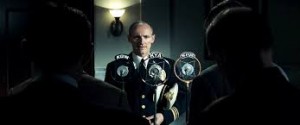
I said, “Oh, I didn’t recognize you. Hi, I’m Colm.” “Do you mind if I rehearse with you, because I never know what he’s going to do, and we just don’t know.” We said, “Okay, let’s do that and, hopefully, we won’t get fired by the end of the day. About half an hour later, a guy in a ball cap comes over and says, “Hi, I’m Clint.” “I know that. I’m Colm.” “Okay, let’s go.” He walked us over. “So we’re going to run through here, the camera will be there, and you good? Okay.”
Luckily, I had worked with his cinematographer, Tom Sterne, and Tom’s crew and camera guys on a thing called Exorcism of Emily Rose with Laura [Linney] years before. I said, “Guys. Lovely to see you again. What are we doing?”
“We’re going to shoot the rehearsal, we’re going to do this, we’re going to do that.” We went live steady cam through 300 people, 4 pages of dialog, bang bang bang, and it was usable for the movie.
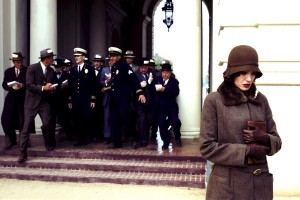
SKA: Wow, intense.
CF: He doesn’t say action; he doesn’t say cut. He starts with, “Okay, go ahead.” Then says something quite like, “All right, that’s enough. Stop.” It’s divine, because if you’re being really good, Angelina was being absolutely brilliant and sparkling one day, and he just didn’t cut. Tom Sterne is running around with sheets of white paper, trying to bounce light off the train station into her eyes so that he can keep going, and that’s how it works.
I asked him, “Why shoot the rehearsal, shoot only a few takes? He says, “Look, actors are probably excited and nervous the first time, but I know you’ve done it because I saw the audition. You already know the lines, so let’s just do it and capture some of that fright and excitement.” Even the best actors, after take 17, you’re not really any good anymore. What you’re capturing is that flowering of something regal and scary, so it was absolutely divine.
SKA: I remember your scene. It was a profound movie. Now was Rob Lorenz on board that day?
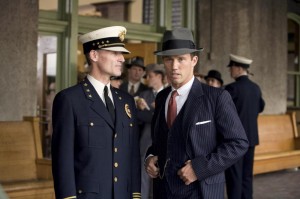
CF: Yes, he was producing. Yeah, absolutely. He was producing what was allegedly Clint’s last film until they were going to do Gran Torino the next minute, and then, “I’m never acting,” Then, “I’ll act in this,” Then, “I’m not directing,” And, “I’ll do another six films. He’s extraordinary. I actually was standing by one morning at breakfast and I was having the oatmeal, and a couple of cranberries and some raisins, thinking I’m being good for myself as an old guy, and along comes Clint, who looks always magnificent, and they said, “Oh, Clint, here’s your breakfast,” And they hand him out oatmeal. Wow, me and Clint, it’s just like that. Until they said, “And here’s the rest of it,” And they handed out grilled salmon, vegetables, potatoes, and this and that.
He had weights outside his office and he would do a little bit of this and that before walking on. I go, “Okay, okay, so maybe we’re not the same.”
SKA: Oh, thank you for those stories.
CF: Everybody had a terrible crush on him too.
SKA: That is just fabulous. I read that you speak fluent French.
CF: You know, my French isn’t fluent. I can pretend to speak French fluently because I have a few tricks. My Irish immigrant parents landed in New York, got married, and I was born in Boston. Then we moved to Canada because that’s where my dad got his first job. Canada is a bilingual country, so “We’ll send him to French school.” We did that for a bit, and then I went to an English school and lost a lot of it. Recently, I’ve been doing movies that have French in it, and so I’ve had to get a lot better at it. Speaking French is actually easy. All you have to do is purse your lips a little bit like the French, like you’re going to kiss somebody. Then, you can ultimately raise and lower your shoulders, and I’m doing this demonstration for you now. Then you make a couple of sounds. (Colm, very animated)
SKA: I wish I had a video right now. (laughing hysterically)
CF: The sounds are…well, it’ll work for you. You’ll be able to see this in your mind’s eye. The sounds are “O, A, O.” That’s all they are, vowels. They can express all kinds of emotion and demands, you can get attention in restaurants, I’ve done it like this. It’s just, “Oh, you, oh, you, oh …” You can throw in, “diablo,” or something you know. “Bonjour, merci.” This actually works, because I was in a restaurant in the South of France, trying to get attention, and we had just come off a cruise ship, and my wife and I disembarked with a lovely Australian couple, and we went to the place that was local. Of course, they heard the Australian accent, and the Americans and Canadians, and they went, “Ignore them.”
The guy ignores them. My wife said, “Use your French.”
I said, “No, no, I’m a little shy, I don’t want …”
“Use your French.”
About 20 minutes after he’d ignored us, I finally went, “Okay, okay.” I kind of barked at him. I raised the shoulders. He snapped to like that, raced over, and we ordered wine, we ordered oysters, and shrimp, and the whole thing was good. He pretended to be very churlish.
My wife then seduced him and said in English, “Oh, you know, your English is so good. I know it’s magical the way you speak English,” And suddenly he turned around and spoke perfect English.
I thought, “You son of a b….” I am improving my French daily, so I don’t mean to joke about it, but I am working at being fluent.
SKA: Love it. Fabulous. I think we have time for one more question. Is there anything you’d like to tell our listeners and my readers about King Lear, the film?
CF: King Lear the film is a very, very terrifically engaging cinematic version of what we did live on stage in one take. It is like being there on October 21st at 2:00 in the afternoon for a performance that we’d been giving for months. We’re polished, we’re ready, and if you can’t make the trip to Stratford [Canada], which is a long way and the tickets are expensive, come to see it for a couple of bucks. The Lear story is simple, straightforward. It’s not poetic. It’s Shakespeare at his most honest and corrosive best. It’s the most human play and probably the most extraordinary play in the English language, ever.
SKA: Oh, fantastic. I want to thank you so much for chatting with me today.
CF: It’s my pleasure. Thanks for having me.
SKA: Good luck with the film.
CF: Thanks a bunch.
Sarah Knight Adamson ©February 25, 2015
